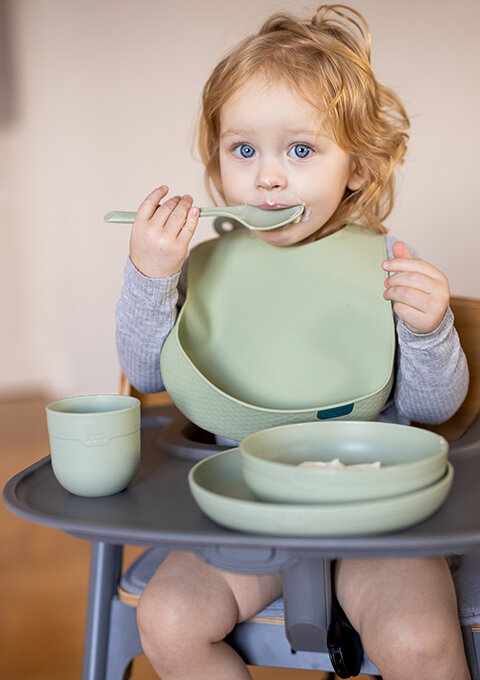When do babies develop taste buds and start tasting food, and what influences their taste preferences? We have the answers.
Expert consultant: Danuta Chrzanowska - Liszewska, MD, paediatric specialist and neonatologist
Babies’ taste buds begin to develop while they are still in the womb. Olfactory cells and the first taste receptors form during pregnancy and continue to develop in the months following birth.
The taste of amniotic fluid can be influenced by the mother's diet. It is therefore so important for expectant mums to have a healthy and balanced diet during pregnancy to help shape their baby's taste preferences.
The World Health Organization recommends exclusive breastfeeding for the first 6 months of life. Breastmilk is naturally sweet, and that is probably why newborns and young infants tend to prefer sweet flavours. However, babies' taste preferences change over time. They start to prefer salty flavours at 4 months and start to accept bitter flavours at 6 months. Sour and umami tastes can be accepted at any age.
Be patient while giving your child new foods as it usually takes between 8 and 15 tries for a baby to like a new dish. Remember also that a period between 6 and 12 months is a “biological window” for learning to eat and developing taste buds, during which babies are more open and receptive to new flavours and may accept new foods even after the first try.
Toddlers may also accept or reject food based on its appearance. As babies get older, it is important to present food in an appealing way, such as by cutting it into interesting shapes or sizes or arranging it on a plate in an interesting and fun way. For example, instead of serving fruit in slices, try cutting it into bars.
Do not add sugar or salt to the first meals. The baby needs to get used to the natural taste of the food.
While it may seem that the lack of seasoning makes the food tasteless, it will still be distinctive for your little one. Instead of using spices, salt, or sugar, try introducing new tastes by introducing new foods. When cooking, try to preserve as much of the natural flavour as possible, using methods such as steaming.
Remember that the baby needs time to adjust to new foods. Instead of adding sugar, wait and give your baby time to get used to the new taste. Start with a small spoonful and gradually increase the amount as the baby becomes more comfortable with the new food. This also helps their digestive system adjust to the new food.
As your baby's diet expands, start offering them something to drink. Water is the best choice for your baby. Don't start with juices. Start with water. If at the beginning your baby refuses to drink water, don’t give up. Even if the baby only drinks a few sips, that's okay. It's better to start small and gradually increase the amount. Be patient and don't change its natural taste. Artificial flavours are often unhealthy. Introduce juices only when your baby is at least one year old.
To ensure a healthy diet from the start, involve the whole family. This will help your baby get used to healthy foods and avoid many health problems in the future.
Pay attention to what you buy, as some children's products may contain unhealthy substances. Check labels and choose products with no added sugar and no flavour enhancers. Check labels on baby food jars too. Try to choose seasonal fruit and vegetables.
Infant gruels are a very important part of your baby's diet. They supply to the demanding body of your baby components necessary for his correct development, including calcium, iron, magnesium, and are supplemented with vitamins, ...
It is said that no child is born a poor eater. Each of us arrives into the world with a natural survival instinct, and this requires eating. However, if your baby has become a poor eater, here you will find some suggestions ...
There comes a moment when mum's breast alone is not enough. Here you can find tips when and how you should introduce new components into your baby's diet.
Read how diet can help a baby to strengthen his immune system, so no illness thwarts your plans for active time outdoors.
